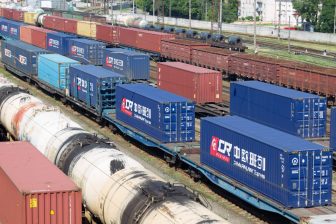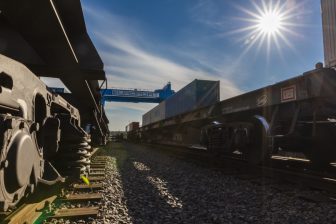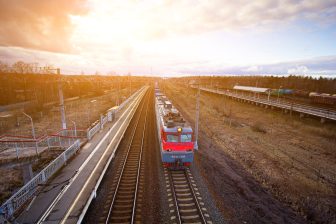‘Europe should not be the hurdle on the New Silk Road’
Europe is the first and the last mile on the New Silk Road. This should be an incentive for European governments to pursue assertive policy when it comes to rail freight, believes Pier Eringa, CEO of the Dutch infrastructure manager ProRail. “If we do not speed up, we will be overtaken by the Chinese.”
Eringa will speak about rail freight in Europe at the Global Rail Freight Conference that kicks off today in Genoa. Addressing an international audience, he will urge governments to move forward. “The Chinese are able to act fast and develop at an impressive pace. This should pressurise us to do the same. It cannot be that Europe becomes a hurdle on the New Silk Road.”
Interoperability
Interoperability remains an issue in Europe, he explains. “ When a cargo train travels through Europe, it faces a patchwork of different systems. We really do something wrong here.” He refers to the the European Rail Traffic Management System (ERTMS), the standardised traffic control system that is currently being rolled out in several countries. In his opinion, Europe has hesitated too long with the implementation of the system.
“We should get started, and we can improve whatever is required on the way. We should not wait until a final concept is agreed upon. A driving train moves faster than a train at standstill; we should move. Fortunately, work is now being carried out and developments are looking promising.”
Innovation
ERTMS is an important basis for a harmonised railway network, but also serves innovative initiatives such as predictive maintenance and driverless train operations, he explains. “This last technology may not be applied in the near future, but we do prepare for train operations with onboard driver assistance. This is important for safety purposes, but also enhances capacity on the track as trains will be able to operate with smaller leap times.”
Another innovation serving rail freight are track and trace services, developed to see when and where cargo is transported. “We should really be able to see where our cargo is. The fact that we are not able to offer this service up till now is a bit strange. It can be done with a chip on a rail car, but again it is a just a matter of implementing technology.”
Reliability
Reliability remains an issue for rail freight as a modality, the CEO said. “Freight trains do not always arrive on time. Many things can happen on the way. This needs to be improved, but if we know when and where our cargo is, we can anticipate the time of arrival,” he argues.
According to the CEO, this is where rail could win ground of other modalities. “Air freight is always more expensive, so considering the costs it is mainly road and barge that compete with rail. Unfortunately, these modalities are considered more flexible and more reliable.” This being said, rail is always more sustainable, he concludes. “In this sense, rail easily wins from other modalities.”
Global Rail Freight Conference
The Global Rail Freight Conference, organised by the UIC, takes place from 26-28 June. Railway and logistics experts from all over the world will gather here to discuss various aspects of the freight industry. For more information, you can visit the dedicated website.





